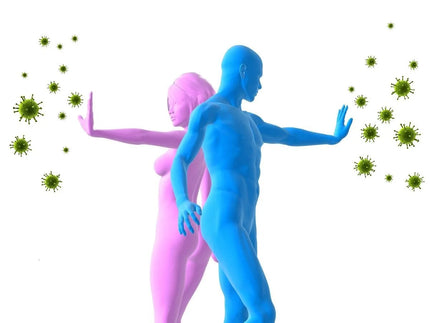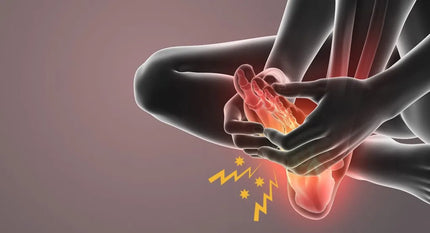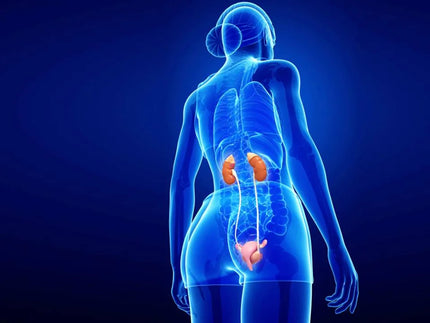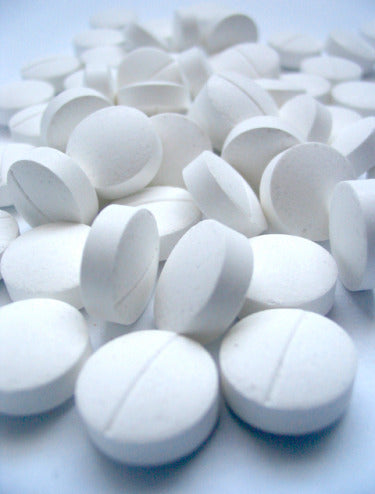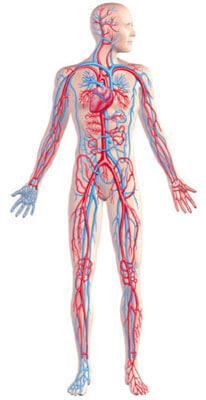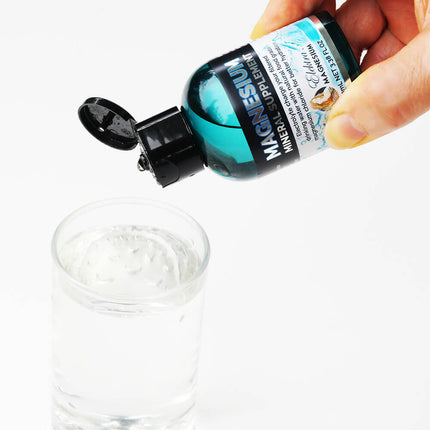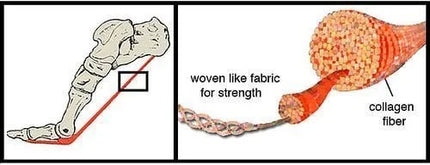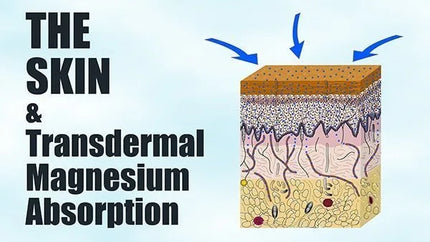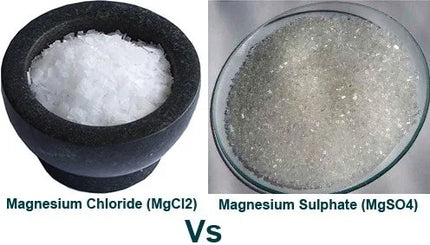Tax included and shipping calculated at checkout
Neuropathic pain is the type of pain you feel if your nervous system has been damaged or isn’t working correctly. The pain comes from the various levels of the nervous system, which include the peripheral nerves, the spinal cord and the brain.
People often describe it as a shooting or burning pain, but it can also be felt as tingling or numbness. Neuropathic pain sometimes goes away on its own, but often it’s a chronic condition that persists, particularly in the senior years when arthritis sets in, or after injuries. For some people, it can be severe and unrelenting and for others, it comes and goes like a phantom.
What are common causes of neuropathic pain?
- Alcholism
- Amputation
- Chemotherapy
- Diabetes
- Facial nerve problems
- HIV infection or AIDS
- Multiple myeloma
- Multiple sclerosis
- Nerve or spinal cord compression from herniated discs or spinal arthritis
- Shingles
- Spine surgery
- Syphilis
- Thyroid problems
Peripheral neuropathy

Peripheral neuropathy refers to the many conditions that involve damage to the peripheral nervous system, the vast communication network that sends signals between the central nervous system (the brain and spinal cord) and all other parts of the body.
Peripheral nerves send many types of sensory information to the central nervous system (CNS), such as a message that the feet are cold. They also carry signals from the CNS to the rest of the body. Best known are the signals to the muscles that tell them to contract, which is how we move, but there are different types of signals that help control everything from our heart and blood vessels, digestion, urination, sexual function, to our bones and immune system. The peripheral nerves are like the cables that connect the different parts of a computer or connect the Internet.
Treatments for neuropathic pain
Anticonvulsant and antidepressant drugs are common treatments for neuropathic pain, and some studies suggest non-steroidal anti-inflammatory drugs (NSAIDs) such as Aleve or Motrin. However, these medications at best just provide a temporary masking of pain, whilst imposing a heavy price of potential side effects such as nausea, kidney injury, gastrointestinal bleeding, heart complications and stroke. 1
Alternative treatments which can help reduce the incidence and intensity of neuropathic pain include:
- Physiotherapy
- Relaxation therapy and sound healing
- Massage therapy
- Acupuncture
- Yoga and Meditation

Whilst these therapies can be helpful, some people find they haven’t lessened their pain to a great extent. Neuropathic pain can become so intense for some people, it leads to a serious disability. In such cases people need to look at combining a range of treatments. Nutrition and lifestyle strategies are very important.

Nerve health and resistance can be improved by healthy lifestyle habits such as maintaining optimal weight, avoiding toxic exposures, eating a balanced diet, and correcting vitamin deficiencies.
Smoking cessation is particularly important because smoking constricts the blood vessels that supply nutrients to the peripheral nerves and can worsen neuropathic symptoms. Exercise can deliver more blood, oxygen, and nutrients to far-off nerve endings, improve muscle strength, and limit muscle atrophy.
Self-care skills in people with diabetes and others who have an impaired ability to feel pain can alleviate symptoms and often create conditions that encourage nerve regeneration. Strict control of blood glucose levels has been shown to reduce neuropathic symptoms and help people with diabetic neuropathy avoid further nerve damage. (More information here).
How does magnesium dampen down the pain?
These days magnesium is widely used to alleviate pain. Magnesium helps with pain because it inhibits calcium ions from entering cells by blocking NMDA receptors, which causes an anti-nociceptive effect, meaning it has a numbing effect to dumb down the pain.
This anti-nociceptive effect is related to the prevention of central sensitisation. Central sensitisation is the result of repetitive inputs in the pathways of the central nervous system which manifests as a prolonged reduction in the pain threshold. 2
In other words, when someone experiences pain stimuli often, the less they can tolerate the pain and the more sensitive they become to even slight provocations. Some can continue to feel pain even after the stimuli have disappeared.2
Magnesium plays an important role in the prevention of central sensitisation and in the reduction of established pain hypersensitivity.
Given the pivotal function of NMDA receptors in pain reduction, the use of magnesium for a variety of pain conditions has been investigated in a number of studies. Beneficial effects of magnesium therapy were found in patients with neuropathic pain, such as malignancy-related neurologic symptoms, diabetic neuropathy, postherpetic neuralgia, and chemotherapy-induced peripheral neuropathy. 2
In addition, magnesium treatment was found to alleviate the pain of fibromyalgia, endometriosis and pre-menstrual tension, dysmenorrhea, headaches and acute migraine attacks. For other types of pain and the science of how pain can be managed, click here.
A controlled study on the role of magnesium in pain management
This study was designed to find out if intravenous and oral magnesium therapy helped patients with chronic low back pain with a neuropathic component. 3
Study method: We recruited a cohort of 80 patients with chronic low back pain with a Leeds Assessment of Neuropathic Signs and Symptoms pain scale score ≥ 12, who were receiving a physical therapy programme. All patients were treated with anticonvulsants, antidepressants and simple analgesics; in addition 40 patients received placebo for 6 weeks (control group), while the other 40 patients received an intravenous magnesium infusion for 2 weeks followed by oral magnesium capsules for another 4 weeks (magnesium group).
Patients were asked to rate their pain using a numerical rating scale. In the magnesium group, the patients' numerical rating scales revealed a significant reduction in pain intensity…The reduction in pain intensity was accompanied by significant improvement in lumbar spine range of motion during the follow-up period.
Conclusion: Our findings show that a 2-week intravenous magnesium infusion followed by 4 weeks of oral magnesium supplementation can reduce pain intensity and improve lumbar spine mobility during a 6-month period in patients with refractory chronic low back pain with a neuropathic component.
The superior contribution of transdermal magnesium, bypassing the digestive system

Transdermal magnesium is a powerful way to treat cramps, pain and inflammation faster than oral supplements. The most efficient form of magnesium able to be taken up by cell membranes is magnesium chloride salt, which, once dissolved, requires no further digestion.
As the digestive system can only cope with low concentrations of magnesium, such as what would be in mineral water and foods, higher concentrations (as in oral magnesium supplements) tend mostly to be excreted, without much passing through the gut wall. They also tend to work like laxatives and can irritate the bowel. However transdermal magnesium absorption (via skin) is gentler and more potent.
Of course soaking in a hot magnesium bath stimulates circulation and helps the skin to open up more to magnesium ion absorption, but if you don’t have time for a daily soak and want to dry-apply magnesium, you get a much better result with the help of plant oils and butters which lubricate skin. Skin loves fats. This is where magnesium cream and lotion, infused with natural magnesium chloride, rises to the top in performance. The better moisturised, the easier the absorption of magnesium.
TIPS: Use transdermal magnesium with massage and/or heat pack to help magnesium be taken up faster by the blood circulation, and to go deeper into muscle tissue.
The gift from Dennis was a Godsend – Customer review by Robyn Andrews
“I was at home wondering if Magnesium would help my chronic pain that prevents sleeping. I’m disabled with spinal leg and foot injuries and severe chronic pain in spite of good diet and sober lifestyle. I cannot take NSAIDs, as they gave me liver disease. I refuse to take drugs or pain killers. I went to buy some kale and Dennis walked up to me out of the blue and gave me one of your 100ml Magnesium Charge Lotions. I was amazed. How did he know? GOD? Anyway, I have even tried expensive ayurvedic liniment from India with 100 herbs, and NO Relief! Your lotion enabled me to get back to sleep.
I’m really struggling at the moment to stay independent and mobile. I refuse surgery or drugs. I also have extreme multiple chemical sensitivity, so I can’t stand fragrances and toxic products, and usually tea tree oil. Even the soap burns my sensitive red-haired skin. But your lotion smells gorgeous and IT WORKS!! Massaging alone or with ayurvedic liniment didn’t work or bring relief, but your lotion DOES bring FAST relief ... Muscle, bone and nerve pain are all a result of my injuries and altered bio-mechanics from limping etc ... So walking causes a lot of muscle pain and cramping, despite taking oral magnesium.
Your Product is a MIRACLE. Also being 62yrs old, and I have many friends to recommend it to. Thank you so much.” Robyn Andrews
By Sandy Sanderson ©2022
See more about Elektra’s transdermal Magnesium Cream, Lotion or Oil Spritz, or go straight to SHOP.

REFERENCES:
(1) Davis, A.; Robson, J. The Dangers of NSAIDs: Look Both Ways. Br J Gen Pract 2016, 66 (645), 172–173. https://doi.org/10.3399/bjgp16X684433.
(2) Na, H.-S.; Ryu, J.-H.; Do, S.-H. The Role of Magnesium in Pain. In Magnesium in the Central Nervous System; Vink, R., Nechifor, M., Eds.; University of Adelaide Press: Adelaide (AU), 2011.
(3) Yousef, A. A.; Al-deeb, A. E. A Double-Blinded Randomised Controlled Study of the Value of Sequential Intravenous and Oral Magnesium Therapy in Patients with Chronic Low Back Pain with a Neuropathic Component. Anaesthesia 2013, 68 (3), 260–266. https://associationofanaesthetists-publications.onlinelibrary.wiley.com/doi/10.1111/anae.12107.




